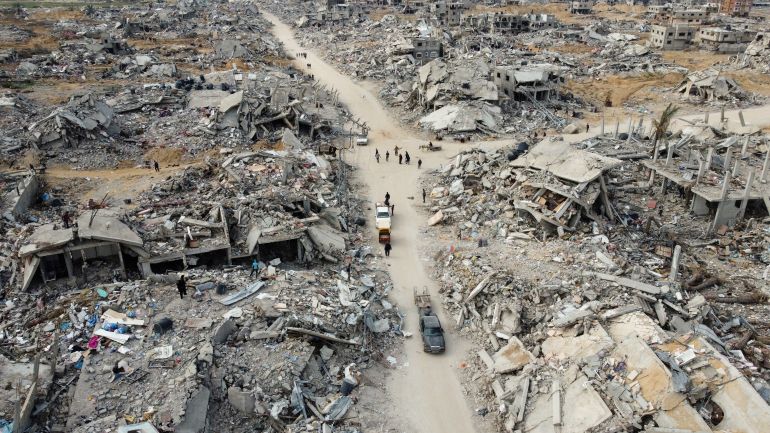28 nations, including the United Kingdom, Japan, and a number of European countries, released a joint statement on Monday, telling Israel that the conflict in Gaza “must end now,” which is the most recent instance of growing criticism from Israel’s allies.
The foreign ministers of these nations criticized “the drip feeding of aid and the inhumane killing of civilians, including children, who seek to meet their most basic needs of water and food,” in a joint statement.
As the occupied Palestinian territory dries up in agony, the world is under increasing pressure from Israel over civilian casualties at aid sites, obstructing humanitarian aid, and violating international humanitarian law.
Since the Hamas attacks on October 7, 2023, which resulted in 1, 139 fatalities and more than 200 captured, Israel’s war on Gaza has resulted in 140, 000 injuries and more than 59, 000 deaths.
What is the joint statement’s purpose, then? These nations, who are they? And how have Israel and its closest ally, the United States, responded?
What was stated in the statement?
The nations are uniting under the simple, urgent message that “the war in Gaza must end now,” according to the joint statement.
The statement stated that the Israeli government’s aid delivery system is “dangerous, fuels instability, and deprives Gazans of human dignity” and that the suffering of civilians there has “new depths.”
They demanded that the Israeli government “observe its obligations under international humanitarian law” and immediately lift the restrictions on the flow of aid.
The group of nations called for the captives’ immediate and unrestricted release and noted that Hamas has “cruelly held” them and that they continue to “suffer terribly.”
A negotiated ceasefire offers “the best chance of bringing the captives home and putting an end to their families,” they claimed in the statement.
What else did the nations say about settler violence and demographic change?
The nations criticized Israel’s “completely unacceptable” plan to create a concentration zone, which is Israel’s attempt to relocate the entire Palestinian population to a fenced, heavily controlled zone built on the ruins of Rafah.
According to the joint statement, “permanent forced displacement is a violation of international humanitarian law.”
The group of nations also reaffirmed their opposition to “any steps toward territorial or demographic change in the Occupied Palestinian Territories,” and pointed out that the E1 settlement plan, which it claimed would split a Palestinian state into two, “marking a flagrant violation of international law and critically]undermining] the two-state solution.”
They also criticized the rise in settler violence against Palestinians while the “settlement building across the West Bank, including East Jerusalem, has accelerated.” This must end.
Which nations ratified the joint statement?
The 28 foreign ministers of the 28 countries who signed the joint statement:
Australia, Austria, Belgium, Canada, Cyprus, Denmark, Estonia, Finland, France, Greece, Iceland, Ireland, Italy, Japan, Latvia, Lithuania, Luxembourg, Malta, Malta, Malta, Malta, Malta, Malta, Malta, the Netherlands, New Zealand, Norway, Poland, Portugal, Slovenia, Spain, Sweden, Switzerland, and the UK.
These governments, many of whom are allies of Israel, have condemned the obstructing aid in the occupied Palestinian territory in some of their most vehement language.
Which of those nations ratifies Palestine?
Nine of these 28 nations, according to the joint statement, acknowledge the State of Palestine as a sovereign state.
Shortly after the 1988 Palestinian Declaration of Independence, Malta, Poland, and Cyprus all granted Palestinian recognition.
Iceland followed in 2011, and Sweden in 2014. In 2024, Slovenia, Spain, Norway, and Ireland all recognized Palestine.
What was Israel’s response?
The group of nations’ joint statement, which Israel rejects, is “distrupt from reality and sends the wrong message to Hamas,” according to Oren Marmorstein, a spokesperson for the Israel Ministry of Foreign Affairs, on X.
Further, Israel claimed that Hamas is “occupied running a campaign to spread lies about Israel” and was purposefully causing friction and harm to civilians who receive humanitarian aid instead of agreeing to a ceasefire.
Hamas “stubbornly refuses to accept” a “concrete proposal for a ceasefire deal,” according to the statement.
What is Hamas’ position on the ceasefire?
Israel was the one who rejected a ceasefire agreement to release all prisoners held in Gaza, according to the military wing’s spokesperson.
Abu Obeida, a spokesperson for the Qassam Brigades, stated in a prerecorded video that Israeli Prime Minister Benjamin Netanyahu and his far-right ministers had rejected a “comprehensive deal” that would have immediately released all captives.
Hamas supports a deal that allows the Israeli military to withdraw, the release of humanitarian aid, and the entry of besieged Palestinians, he said, adding that it has become clear that the government of the criminal Netanyahu has no real interest in the captives because they are soldiers.
In Gaza, Hamas is still holding 50 people, with 20 of whom are reportedly still alive.

What is Israel’s restriction on entering Gaza, which Hamas claims it can use?
Hamas claims that it could divert or repurpose the necessary humanitarian supplies for military use, so Israel continues to obstruct access to Gaza.
Baby formula, food, water filters, and medicines are among the items that were omitted.
As part of Israel’s “dual-use” restrictions, which claim to be intended to prevent Hamas exploitation in military settings, are medications and medical supplies blocked.
Other medical supplies, such as anaesthetics, oxygen cylinders, and cancer medications, have been restricted.
According to Israeli authorities, some products, such as some chemicals or electronics, may have dual-use potential.
Source: Aljazeera

Leave a Reply